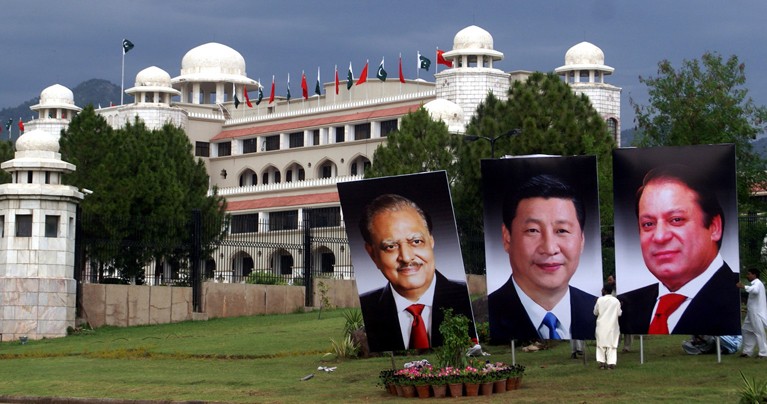
Will the promised $45 billion investment turn around Pakistan’s economy putting it on the road to perpetual prosperity

After the historic two-day visit of the Chinese President Xi Jinping this week, the Pakistani civilian and military leadership has been brimming with hope that the $45+ billion promised investment will turnaround the Pakistani economy and the country will be on the road to perpetual prosperity.
While this may stand true if one sees the investment figures, but the reality on ground is much more complex, especially given the fact that the main thrust of the project called Pak-China Economic Corridor (PCEC) is in the restive Balochistan province, which has been suffering from an insurgency for the last 10 years now.
Not only that, many political and social activists have voiced their concern with regards to the rumours that there may be a route change in the corridor, albeit there has been a strong government denial on that front, saying that the corridor will have a combination of 3,000 kilometres long roads, railway networks and pipelines.
However, local reports suggest that the Federal Government may be interested in developing the Eastern side of the project first, and ignore the Western-side of the project, which if happens can create further misunderstanding among the Baloch, that already feel marginalised by what they refer to as the mainstream Pakistan, or specifically the Punjab-led administration as they call it.
"Not only will it create further disillusionment amongst the local population if the government goes ahead with developing the eastern side of the project first, it will also lend more credibility and legitimacy to the claims of the Baloch rebels, who insist that Pakistani establishment can never think good for the indigenous people of the province," says Munir Kakar, a social activist and an educationist, based in Quetta.
According to Kakar, there has always been exclusivity when it comes to decision-making processes with regards to Balochistan. "There is very little input taken from the local leadership and that is a further cause of concern. For example, even now the Planning Commission has no Baloch representation and so when they implement such projects, they face difficulties as they have not carried out an inclusive process to begin with," he adds.
Some however argue that unless there isn’t a secure environment, there can be no economic progress but others feel that the government should be able to do this concurrently. It can only do this if it involves the local Baloch leadership and also ensures that the project focuses first on especially those areas of Balochistan that are most impoverished. This will in turn build the credibility of the government’s intentions and hence improve the security situation.
For now, the government has approved the creation of a 10,000-man strong special force for protecting the development projects to be carried out under the PCEC and the Chinese workers associated with them.
Besides the security aspect, some also feel that the numbers especially the $45 billion investment seems unrealistic and because there is a lack of transparency especially with regards to the energy projects that are entailed in the PCEC, no one knows for sure what is to come.
"There is a lot of room for improvement in transparency. The government has a poor track record in terms of transparency and disclosure," says Khurram Husain, a political economist.
According to Husain, transparency is especially needed on the terms of this investment. "These contracts are not being given on any competitive bidding process. They are being given on very non-transparent terms," he adds.
He also feels that Pakistan, because of its desperation to turn around the economy, may not be driving a hard bargain. And not just that, Pakistani government is overwhelmed by the rhetoric of the Chinese president. "We need to bargain hard and not be swept away by such kind words which are nothing more than rhetoric. Business should be business but Pakistani government seems unable to see through that," Husain says.
Those who have been reporting on this issue say that they felt the government was not very forthcoming during the visit of the Chinese president and most of the press conferences were more a one-sided communication.
"This is not the first time the relationship and the inside details have been kept secret. Pakistan has a history of being very secretive when it comes to China," says Baqir Sajjad, who reports from Islamabad on foreign and defence issues.
Not only has the media felt ignored, other mainstream political parties feel the same way.
"The Minister for Planning Commission [Ahsan Iqbal] has not provided any mainstream political parties any details of sites, budgets and plans for economic zones or related projects. He keeps saying that nothing has been finalised as yet," says Bushra Gohar senior vice president Awami National Party.
Gohar says that instead of providing relevant information, initiating public debate and ensuring transparency, the minister has accused them of working on foreign agenda when they have pressed for more information. "He is levelling wild allegations saying that those who are asking for transparency have received money to make the project controversial," Gohar adds.
According to reports, China currently has excessive liquidity which it needs to recycle internationally, and it has been doing so -- in Africa, Central Asia, Latin America and even in India. This is because its own capacity to absorb this liquidity in domestic infrastructure projects has been exhausted and hence it is looking for foreign avenues to invest that money. And so if Pakistan is able to deliver its side of the bargain, in terms of providing a secure environment, China seems more committed than ever.
"China is not only looking for profits in Pakistan. It also has a strategic interest, as it gets more involved in the global markets and politics and for that Pakistan can serve its purpose well. But Pakistan needs to understand this and put its house in order," adds Sajjad.